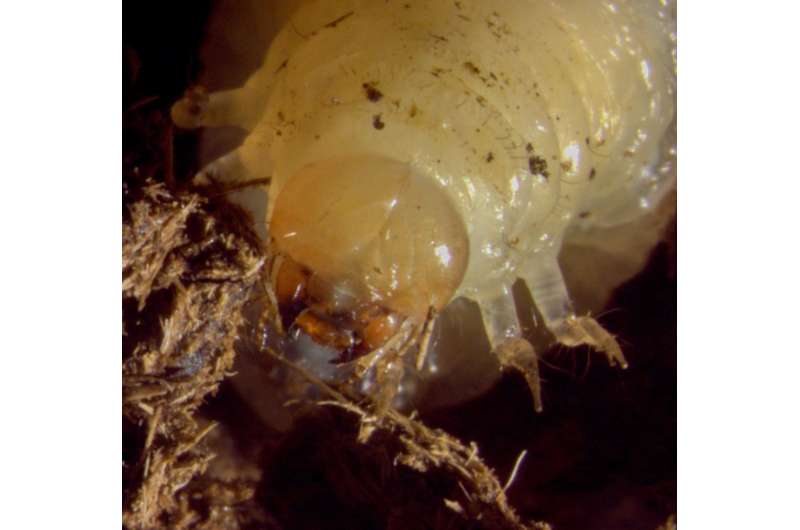October 2, 2018 report
Nematodes found to positively influence dung beetle larval microbiomes

A team of researchers at Indiana University has found that a type of nematode offers a positive influence on the dung beetle larval microbiome. In their paper published in Proceedings of the National Academy of Sciences, Cristina Ledón-Rettig, Armin Moczek and Erik Ragsdale describe their study of the relationship between the nematode Diplogastrellus monhysteroide and dung beetles.
In their study, the researchers found that the nematodes take up residence in the genitals of the adult dung beetles. This allows the nematodes to be passed back and forth between adults when they copulate. It also allows the nematodes to be passed to brood balls.
Brood balls are wads of herbivore dung that the female dung beetles make—they use them as incubators for their eggs. After the eggs hatch, the larvae eat the ball from the inside out. But material in plants is difficult to digest. As it turns out, the larva gets some help from nematodes.
Testing of brood balls showed they were alive with nematodes. But instead of causing problems for the larva, the nematodes were causing a beneficial change to the microbiome inside of the balls. The presence of nematodes caused changes to the levels of some bacteria and fungi living in them—some types of bacteria grew in number, while fungi became scarcer. This benefited the larvae because the bacteria were the kind that break down plant fibers and the fungi were the kind that sometimes infect beetle larvae. Thus, the presence of the nematode made it easier for the larvae to eat, and less likely to be harmed by a fungal infection.
To better understand the impact on the microbiome inside the brood balls, the researchers killed the nematodes inside some of them before allowing female dung beetles to deposit eggs. The researchers report that larvae growing without the nematodes developed more slowly into undersized adults.
The researchers were not able to isolate the means by which the nematodes changed the microbiome, but suspect they might have been eating the bacteria that competed with the beneficial bacteria, making it easier for the beneficial bacteria to flourish. They also suggest it is possible the worms emit chemicals that have an impact on bacteria and fungus.
More information: Cristina C. Ledón-Rettig et al. Diplogastrellus nematodes are sexually transmitted mutualists that alter the bacterial and fungal communities of their beetle host, Proceedings of the National Academy of Sciences (2018). DOI: 10.1073/pnas.1809606115
Journal information: Proceedings of the National Academy of Sciences
Provided by Phys.org
© 2018 Phys.org





















